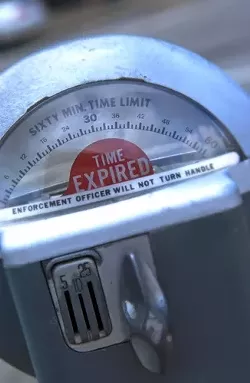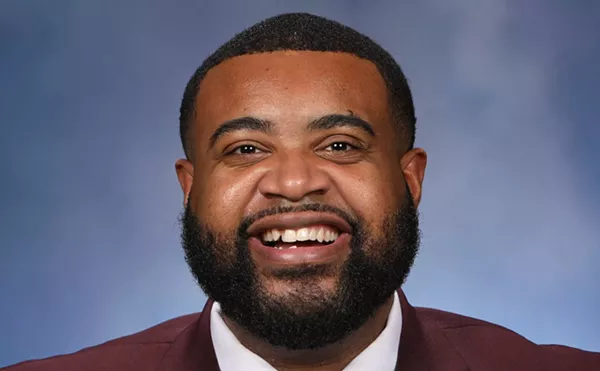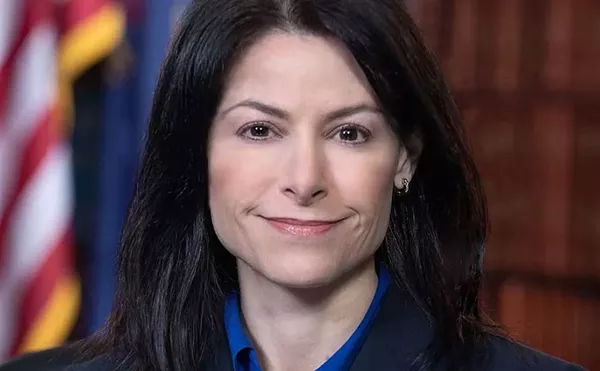Orr seeks proposals to privatize Detroit parking system
Bidders could manage system or outright purchase it

Audio By Carbonatix
[
{
"name": "GPT - Leaderboard - Inline - Content",
"component": "35519556",
"insertPoint": "5th",
"startingPoint": "3",
"requiredCountToDisplay": "3",
"maxInsertions": 100,
"adList": [
{
"adPreset": "LeaderboardInline"
}
]
}
]

[Update, Thursday, July 32, 2014, 10:20 a.m.: Detroit's city council turned down Orr's resolution to issue a request for proposals, according to The Detroit News. Orr's spokesperson told the newspaper that the issue could come back to the council for a vote, but Orr was reviewing the action "and no final decision has been made." ]
If Detroit Emergency Manager Kevyn Orr’s decision to raise parking violation fines had you reeling in pain, News Hits has some potentially unfortunate developments to report.
Orr, who’s planning to leave town in the coming months, has decided to move ahead with what’s a surprise to no one: a solicitation for proposals to either run Detroit’s entire municipal parking department, or buy the system outright. By the time you read this, City Council may have already signed off on Orr’s request to allow him to issue a request for proposals.
According to Orr’s office, interested buyers could present their bids for the parking department — which includes seven garages, about 3,200 meters, and a towing operation — in a number of ways: to manage the entire operation, a portion of the system, or the bidder could purchase the entire package.
Needless to say, this got our attention. Anyone who’s familiar with Chicago’s privatized parking mishap might understand why. The Windy City’s decision to lease its meters to a group of investors cobbled together by (friend to everyone) Morgan Stanley for an upfront lump sum of $1.2 billion has been derided worldwide.
Why’s that, you ask? Matt Taibbi, the former Rolling Stone scribe who’s now at First Look Media, summed up the issues back in 2012.
In Chicago, Taibbi writes, “Mayor Richard Daley sold 75 years of meter revenue — worth an estimated $5 billion — for $1.2 billion. So he gets 20 cents on the dollar for the city’s parking meters in 2008, and then in 2009 the city still has a budget problem that’s now worse, because there’s no parking meter revenue anymore, ever.”
That’s right. Chicago took the loot, plugged a few holes in its budget, and, soon after, found its finances were still problematic. Meanwhile, as one might expect, those investors jacked up parking rates — some neighborhoods seeing an increase from 25 cents per hour to $1.20 per hour — and the city ceded control of the system.
Worse, Chicago taxpayers will spend about $11.6 billion over the 75-year lease, according to Bloomberg, netting that lucky group of investors a roughly $9.6 billion profit. Not bad for a public-private partnership!
Coincidentally, the consultant who designed Chicago’s long-term lease, Desman Associates, was hired by Orr to put together a report on the city’s parking operation and potential options. Desman says in a memo to the city that Detroit will need to spend $40 million in repairs to get its parking system up to snuff. So it might be best to dump it onto someone else, even if they raise parking rates (a regressive tax, mind you) while make a killing off the deal. (Doesn’t that make you feel good?)
Now, don’t take us for fools. We know the city’s parking system is a mess; over half the meters don’t work, and the Cultural Center garage has been closed due to disrepair.
But the short-term outlook doesn’t look pretty, especially with the push to send Orr packing. It’s always a perfect time to craft an important deal when you’re on a serious time crunch, no?
If Orr is interested in landing a good deal for Detroit, he shouldn’t take the Chicago approach with an upfront lump sum: That was the point of view offered by Richard Little, director of the Keston Institute for Public Finance and Infrastructure Policy at the University of Southern California, in an interview with Michigan Radio earlier this year.
Little told Michigan Radio’s Sarah Cwiek that Detroit could do itself a favor by bargaining for a percentage of future parking revenues.
If the privatization parking plan moves ahead, a contract could be presented to City Council for approval in October, according to Orr’s office.





